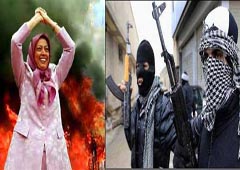The terrorist Mojahedin-e Khalq Organization (MKO, also known as MEK, NCRI and PMOI) has been providing military training to the Free Syrian Army (FSA) and other militant groups in Syria, a defected  member disclosed on Monday.
member disclosed on Monday.
Speaking to Ashraf news website, former MKO member Mohammad Razzaqi said the MKO has been training some militant groups fighting the Syrian government, including the FSA, on bomb manufacturing, planting and detonation methods, assassination and street war.
He noted that some MKO leaders have had a series of meetings with the Syrian opposition leaders in France and Jordan and discussed help and assistance to the FSA and a number of other extremist Salafi groups in Syria.
Following similar reports in the last two years, Iranian officials stated that the collaboration between the ringleaders and members of the MKO and the FSA “displays the real face and goals of insurgents in Syria”.
"The invitation of the deputy commander of the FSA, the armed forces who are opposed to the Damascus government, to the MKO shows that they themselves are terrorists," member of the parliament’s National Security and Foreign Policy Commission Ebrahim Aqa-Mohammadi said.
He added that the invitation of the Syrian group to the MKO to visit Damascus displays that the terrorist MKO is a role model for the Syrian insurgents.
In late 2012, an FSA commander said the MKO played as a role model for Syrian insurgents.
“Mojahedin-e Khalq is our role model, and we inform them that all doors of our houses are open to them,” Malek al-Kurdi, a deputy commander of the so-called Free Syrian Army, said, addressing a joint meeting of the MKO and the ringleaders of the anti-Assad armed rebel groups.
The last group of MKO terrorists at Camp Ashraf, now called Camp New Iraq, was evicted by the Iraqi government on September 11 to join other members of the terrorist group in the former US-held Camp Liberty, now called Camp Hurriya, near Baghdad International Airport where they are awaiting relocation to other countries.
The MKO, founded in the 1960s, blended elements of Islamism and Stalinism and participated in the overthrow of the US-backed Shah of Iran in 1979. Ahead of the revolution, the MKO conducted attacks and assassinations against both Iranian and western targets.
The group started assassination of the citizens and officials after the revolution in a bid to take control of the newly-established Islamic Republic. It killed several of Iran’s new leaders in the early years after the revolution, including the then President, Mohammad Ali Rajayee, Prime Minister, Mohammad Javad Bahonar and the Judiciary Chief, Mohammad Hossein Beheshti who were killed in bomb attacks by the MKO members in 1981.
The group fled to Iraq in 1986, where it was protected by Saddam Hussein and where it helped the Iraqi dictator suppress Shiite and Kurd uprisings in the country.
The terrorist group joined Saddam’s army during the Iraqi imposed war on Iran (1980-1988) and helped Saddam and killed thousands of Iranian civilians and soldiers during the US-backed Iraqi imposed war on Iran.
Since the 2003 US invasion of Iraq, the group, which now adheres to a pro-free-market philosophy, has been strongly backed by neo-conservatives in the United States, who eventually took the MKO off the US terror list.
The US formally removed the MKO from its list of terror organizations in early September 2012, one week after the then Secretary of State, Hillary Clinton, sent the US Congress a classified communication about the move. The decision made by Clinton enabled the group to have its assets under the US jurisdiction unfrozen and do business with the American entities, the State Department said in a statement at the time.
The conflict in Syria started in March 2011, when sporadic pro-reform protests turned into a massive insurgency following the intervention of western and regional states.
The unrest, which took in terrorist groups from across Europe, the Middle-East and North Africa, has transpired as one of the bloodiest conflicts in recent history.
As the foreign-backed insurgency in Syria continues without an end in sight, the US government has boosted its political and military support to Takfiri extremists.
Washington has remained indifferent to warnings by Russia and other world powers about the consequences of arming militant groups.

